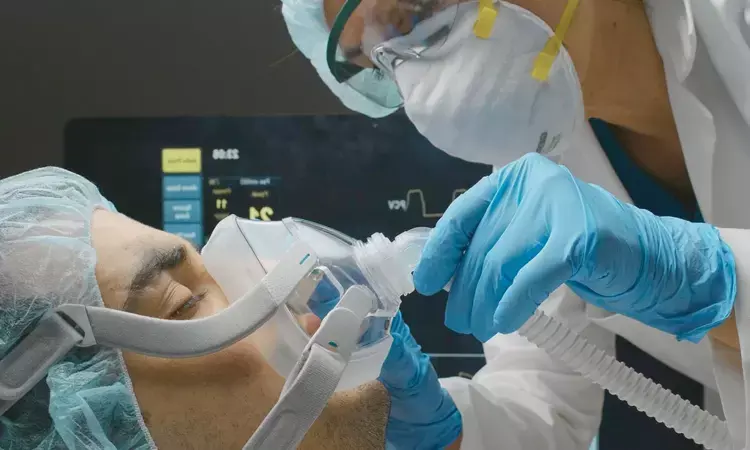- Home
- Medical news & Guidelines
- Anesthesiology
- Cardiology and CTVS
- Critical Care
- Dentistry
- Dermatology
- Diabetes and Endocrinology
- ENT
- Gastroenterology
- Medicine
- Nephrology
- Neurology
- Obstretics-Gynaecology
- Oncology
- Ophthalmology
- Orthopaedics
- Pediatrics-Neonatology
- Psychiatry
- Pulmonology
- Radiology
- Surgery
- Urology
- Laboratory Medicine
- Diet
- Nursing
- Paramedical
- Physiotherapy
- Health news
- Fact Check
- Bone Health Fact Check
- Brain Health Fact Check
- Cancer Related Fact Check
- Child Care Fact Check
- Dental and oral health fact check
- Diabetes and metabolic health fact check
- Diet and Nutrition Fact Check
- Eye and ENT Care Fact Check
- Fitness fact check
- Gut health fact check
- Heart health fact check
- Kidney health fact check
- Medical education fact check
- Men's health fact check
- Respiratory fact check
- Skin and hair care fact check
- Vaccine and Immunization fact check
- Women's health fact check
- AYUSH
- State News
- Andaman and Nicobar Islands
- Andhra Pradesh
- Arunachal Pradesh
- Assam
- Bihar
- Chandigarh
- Chattisgarh
- Dadra and Nagar Haveli
- Daman and Diu
- Delhi
- Goa
- Gujarat
- Haryana
- Himachal Pradesh
- Jammu & Kashmir
- Jharkhand
- Karnataka
- Kerala
- Ladakh
- Lakshadweep
- Madhya Pradesh
- Maharashtra
- Manipur
- Meghalaya
- Mizoram
- Nagaland
- Odisha
- Puducherry
- Punjab
- Rajasthan
- Sikkim
- Tamil Nadu
- Telangana
- Tripura
- Uttar Pradesh
- Uttrakhand
- West Bengal
- Medical Education
- Industry
Plasma Aldosterone levels may not predict ICU mortality in patients treated for COVID-19: Study

Poland: Plasma aldosterone levels do not predict 28-day mortality in patients treated for COVID-19 in the ICU, a recent study published in Scientific Reports has revealed.
Other factors, including the patient's age, C-reactive protein (CRP), or creatinine contribute to the prognosis and severity of the disease.
In this study, the researchers attempted to find an association between the serum aldosterone levels measured on days 1, 3, 5, and 7 and the overall survival in the intensive care unit (ICU) for 28 days. They found higher mean plasma aldosterone levels in the patients who did not survive for 28 days, however, the results were not statistically significant, suggesting that aldosterone is not associated with ICU mortality.
Aldosterone's immunotropic effects might play a role in COVID-19, as SARS-CoV-2 reportedly uses angiotensin-converting enzyme 2 receptors as an entry point into cells. The function of aldosterone closely relates to its action on mineralocorticoid receptors in the kidneys; it increases the renal retention of sodium and the excretion of potassium, which raises blood pressure (BP). Despite several studies investigating the effect of Ang-II and its blockers on the course of COVID-19 infection, there is no clarity on the role of aldosterone.
Against the above background, Jarosław Janc, Hospital of the Ministry of the Interior and Administration, Wrocław, Poland, and colleagues aimed to assess the correlation of aldosterone, creatinine, urea, CRP, and procalcitonin (PCT) levels with 28 days of mortality in patients treated for COVID19 in an ICU.
For this purpose, the researchers conducted a cross-selection study comprising 115 adult patients. They were divided into two groups: those who died within 28 days (n = 82) and those who survived (n = 33).
The researchers performed a correlation of urea, aldosterone, PCT, and CRP levels with 28 days of mortality in patients treated for COVID-19. They also analyzed patient's sex, age, scores from the SAPS II, APACHE II, and SOFA scales, and comorbidities like hypertension (HA), ischemic heart disease (IHD), and diabetes (DM).
The investigation employed univariate and multivariate Cox proportional hazard regression models to explore mortality-related factors.
The study led to the following findings:
- The individuals who survived for 28 days were of significantly lower mean age and achieved notably lower scores on the APACHE II, SAPS II, and SOFA assessment scales.
- Statistically significantly higher CRP levels were observed on days 3, 5, and 7 in individuals who survived for 28 days.
- Creatinine levels in the same group were also statistically significantly lower on days 1, 3, and 5 than those of individuals who died within 28 days.
- In the univariate analysis, variables with a p-value of less than 0.50 were included in the multivariate model.
- Age, APACHE II, SAPS II, and SOFA demonstrated significance in univariate analysis and were considered to be associated with mortality.
- The outcomes of the multivariate analysis indicated that age (HR = 1.03) served as a robust predictor of mortality in the entire study population.
In conclusion, the plasma aldosterone level is not associated with ICU mortality in COVID-19 patients. Other factors, including the age, CRP, and creatinine of the patients' contribute to the severity and prognosis of the disease.
"More research is needed to reach a definite conclusion," the researchers wrote.
Reference:
Janc, J., Janc, J. J., Suchański, M., Fidut, M., & Leśnik, P. (2024). Aldosterone levels do not predict 28-day mortality in patients treated for COVID-19 in the intensive care unit. Scientific Reports, 14(1), 1-8. https://doi.org/10.1038/s41598-024-58426-8
Dr Kamal Kant Kohli-MBBS, DTCD- a chest specialist with more than 30 years of practice and a flair for writing clinical articles, Dr Kamal Kant Kohli joined Medical Dialogues as a Chief Editor of Medical News. Besides writing articles, as an editor, he proofreads and verifies all the medical content published on Medical Dialogues including those coming from journals, studies,medical conferences,guidelines etc. Email: drkohli@medicaldialogues.in. Contact no. 011-43720751


